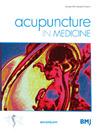Acupuncture for female sexual dysfunction: a case report.
IF 2.4
3区 医学
Q2 INTEGRATIVE & COMPLEMENTARY MEDICINE
引用次数: 1
Abstract
Female sexual dysfunction (FSD) refers to the inability of women to meet their own expectations with respect to their sex lives, resulting in a lack of satisfaction. Typical symptoms include low libido or difficulty with arousal, orgasmic disorders, or painful intercourse. A meta-analysis showed that the prevalence of FSD in premenopausal women is approximately 40.9%, and the prevalence of individual sexual dysfunction is 20.6%–28.2%.1 The most effective treatment method is hormone therapy,2 but this might have detrimental side effects. Although FSD is not life-threatening, it can have a huge negative impact on quality of life. Patients with FSD have a higher prevalence of anxiety and depression than unaffected individuals.3 Accordingly, alternative treatment options with fewer potential side-effects are desirable. Acupuncture, which has minimal side-effects, is widely used in diseases of the genitourinary system. However, there is currently limited evidence to support acupuncture in the treatment of FSD. Here, we describe a case in which a patient with FSD seemed to be successfully treated by acupuncture.针刺治疗女性性功能障碍1例。
本文章由计算机程序翻译,如有差异,请以英文原文为准。
求助全文
约1分钟内获得全文
求助全文
来源期刊

Acupuncture in Medicine
INTEGRATIVE & COMPLEMENTARY MEDICINE-
CiteScore
4.70
自引率
4.00%
发文量
59
审稿时长
6-12 weeks
期刊介绍:
Acupuncture in Medicine aims to promote the scientific understanding of acupuncture and related treatments by publishing scientific investigations of their effectiveness and modes of action as well as articles on their use in health services and clinical practice. Acupuncture in Medicine uses the Western understanding of neurophysiology and anatomy to interpret the effects of acupuncture.
 求助内容:
求助内容: 应助结果提醒方式:
应助结果提醒方式:


